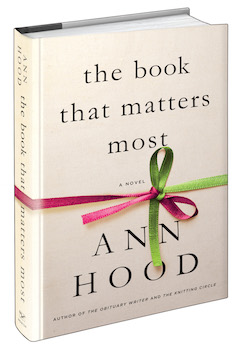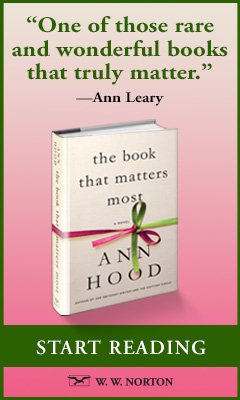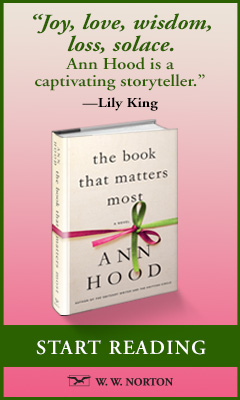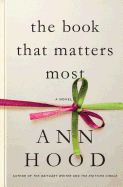The Book That Matters Most
by Ann Hood
After 25 years of marriage and two kids, Ava's husband has left her for another woman. Reeling from the upheaval in the secure life she thought she had, Ava curls into herself, pulling back from social activities and outings--until her best friend, Cate, invites her to join her small and intimate book club. This group proves central to the story of Ann Hood's The Book That Matters Most.
The novel takes its title from the theme of the book club's reading for the upcoming year; each of the 10 members is asked to select one book that matters most to them for the club to read and discuss. As fellow members rattle off titles of classics--Pride and Prejudice, Anna Karenina, The Catcher in the Rye, The Great Gatsby--Ava panics, realizing she's come to her first meeting unprepared. When her turn comes, she blurts out the first title to come to mind: From Clare to Here, the book she read over and over again the summer right after her sister died and her mother took her own life. Hoping to convince the book club to go along with her strange (and out-of-print) suggestion, Ava promises to get the author to come to speak to the club--a task that proves more Herculean than she'd originally intended, and opens doors into her past she may have preferred to leave closed.
As Ava's story unfolds, so, too, does the story of her daughter, Maggie, known to get into more than a spot of trouble but presumed by both Ava and her soon-to-be ex-husband, Jim, to be getting her life on track. Maggie is supposedly studying art history at a program in Florence, but has, without her parents' knowledge, dropped out and fled to Paris, where she is living with a man under increasingly dangerous circumstances. Ava and Maggie's stories move in parallel, revealing not only the depth of their individual growth as women across the course of the novel, but a profound shift in their relationship as mother and daughter.
Layered into this parallel story of mother and daughter--which reads with an element of mystery, as Hood slowly reveals the story of what happened in Ava's past that haunts her to this day, and what will happen to Maggie as she makes a series of increasingly bad decisions--is a much darker story of loss and its accompanying grief. Ava grieves the unraveling of her marriage, and the crumbling of the life she thought she wanted, but also the deaths of her sister and mother, which came in rapid succession the year Ava turned 12. Author Ann Hood experienced great loss herself (she chronicled her grieving process after losing her five-year-old daughter in 2002 in her memoir, Comfort: A Journey Through Loss), and the moments when Ava reflects on her own grief are especially forceful. "I just mean that grief is more powerful than you think," Ava tells Cate at one point, as she tries and fails, again, to suppress the images of her sister's lifeless body that come to her unbidden.
Though these reflections on all that Ava has lost can be heavy, The Book That Matters Most is never without hope--and that hope is most often brought about in the careful ways in which Hood has woven the books that matter most into her novel's plot. "I never thought a book could help with, you know, life," says one book club member--a widower, his eyes wet with tears--to Ava after reading his selection from Slaughterhouse-Five. "But honestly, when I reread this one for tonight, and I thought about time travel and stuff, it actually made me feel better. Or maybe understand something?... I was hoping maybe it helped you too?... All of you?"
Just as Slaughterhouse-Five does for John the widower, each book the club reads helps Ava understand something: something about herself, something about her family, or something about her past. "Somehow, sitting here tonight thinking about choices and the dichotomy of weight and lightness, she felt as if she understood [her mother] for the first time." Each book opens Ava up a little bit, moving her toward the woman she needs to be. And in this way, The Book That Matters Most is in itself a book that matters very much. It is a novel that stands as a testament to the power of reading in our lives, in every moment, both big and small, and as an activity that connects us not only to the world we live in, but to each other. --Kerry McHugh








_Catherine_Sebastian_300dpi.jpg)